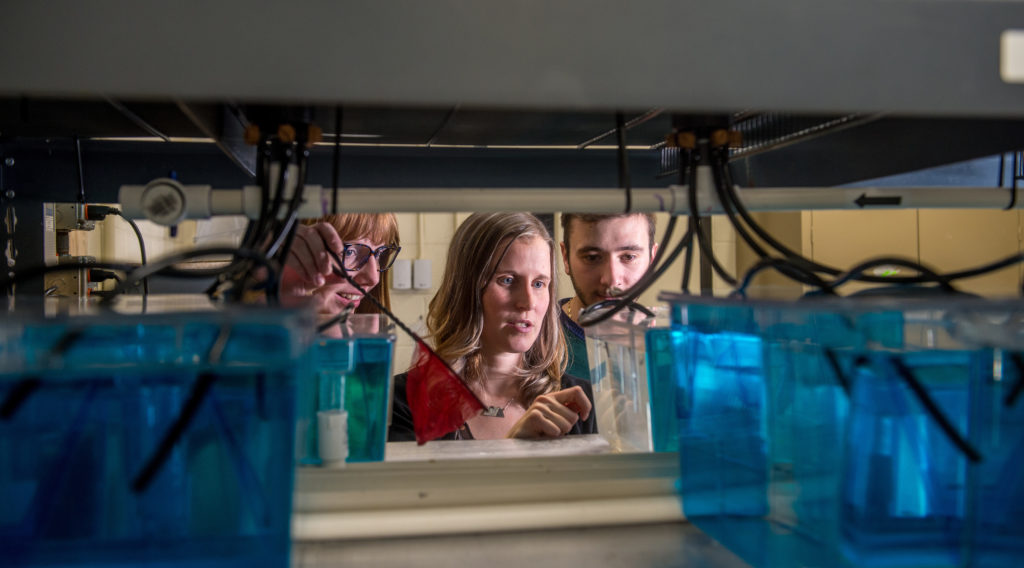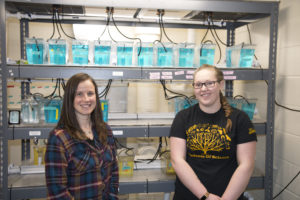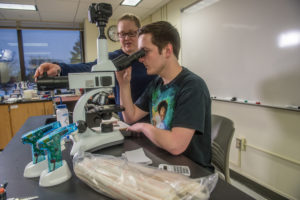
UW-Superior assistant professor Dr. Jenean O’Brien, center, is hopeful that her research will aid in better understanding muscle and immune development to provide insight into rhabdomyosarcoma (RMS), a devastating pediatric muscle cancer.
Research involving zebrafish at UW-Superior could play a role in learning more about a pediatric cancer
Fluorescent light illuminates rows of tanks organized neatly on three shelves. Small black and white fish circle about. As recirculating water bubbles, it’s a scene reminiscent of any pet store.
University of Wisconsin-Superior assistant professor Dr. Jenean O’Brien has an interest in these tropical fish that goes beyond any entertainment or stress-relieving factor they may have. She’s hoping these 1- to 2-inch black-striped fish could play a role in learning more about a pediatric cancer.
“My research involves using zebrafish,” said O’Brien. “They are used a lot for developmental biology. When they lay their eggs, the eggs are transparent. Developmental biologists are watching how the embryo develops into the adult. If we can see through the tissues, that’s a really useful tool.”
O’Brien is hopeful that her research will be able to better understand muscle and immune development to provide insight into rhabdomyosarcoma (RMS), a devastating pediatric muscle cancer with less than 30-percent five-year survival rates. Patients with RMS are primarily treated with chemotherapy and radiation, not specific molecularly-targeted therapies. More than 50-percent of childhood cancer survivors experience severe, disabling, life-threatening or fatal events often stemming from non-targeted treatments. The research being performed at UW-Superior could help improve treatment options.
“What we’re interested in is looking at the DNA and seeing what genes get turned on and off in normal development and seeing if that’s similar to the genes that get turned on and off in tumor development,” said O’Brien. ”RMS is relatively easy to model in zebrafish, so that’s why we’re looking at this particular type of cancer.”
With the aid of the zebrafish, O’Brien is examining two separate different settings – one is developmental and the other is cancer.

Dr. O’Brien (left) and a UW-Superior student researcher stand in front of zebrafish samples they are using to understand muscle and immune development.
“Cancer, the development of tumors, often utilizes programs that our cells use during normal development,” said O’Brien. “The cancer cells kind of takeover that machinery and use it for tumor-building purposes. If you can study what is normally happening in development in our cells and our bodies, it can help get insight for what tumors might be doing.”
Cancer research has been a consistent theme in her work. O’Brien earned her Ph.D., at the University of Colorado Denver. For her post-doctoral work, she trained in two separate labs – one with a developmental biologist to learn more about zebrafish and another with a breast cancer researcher to learn more about the particular genes, which O’Brien is continuing to research at UW-Superior.
“I really like doing cancer research because it feels like it’s that much closer to the patients,” she said. “I like developmental biology. Sure you can be studying a developmental disease, but cancer affects so much of the population. I couldn’t leave cancer research.”
The current research project at UW-Superior has been greatly benefited by a grant awarded to O’Brien from the National Institutes of Health, which funds three paid summer internship experiences for students and allows O’Brien the time in her teaching schedule to monitor more students performing research projects.
“I was hoping to have this research happen no matter what,” said O’Brien. “It’s just now, with the grant, the scope of it is much larger and the number of students that we can involve is a lot higher.”
During the spring semester, O’Brien has six students working with her – something that could not have happened without the grant.
“I purposefully chose a teaching career because I want to work with students not do full time research. But research has to be part of that training of a scientist,” she said. “We actually get to have these authentic research opportunities and we know that our students are really excited about them.”
For students, they are able to participate in research O’Brien has been organizing since she arrived at UW-Superior in 2015. Yet the size of this project isn’t something one individual can create. O’Brien has had assistance that has ranged from a fellow faculty member and student working to build the zebrafish facility to support from colleagues at The College of St. Scholastica, the University of Minnesota Duluth and the Environmental Protection Agency.
“Seeing the greater research community and our campus community work together to create this opportunity for students has been pretty cool,” said O’Brien. “You really can’t do research yourself. One person can’t create a molecular biology research lab. It takes a group of people – it takes a community.”
News Contact: James Biros | 715-394-8260 | jbiros@uwsuper.edu


